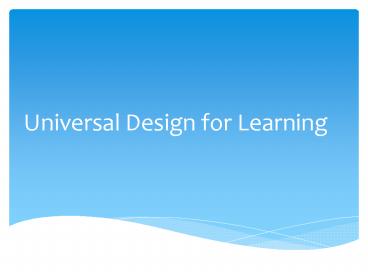Universal Design for Learning - PowerPoint PPT Presentation
Title:
Universal Design for Learning
Description:
First, he was instructed to identify the ages of ... for Learning. Three Principles of ... multiple means of engagement in an English Language Arts high ... – PowerPoint PPT presentation
Number of Views:341
Avg rating:3.0/5.0
Title: Universal Design for Learning
1
Universal Design for Learning
2
Universal Design (UD)
- UD originated in architecture and urban planning,
as part of a movement to begin designing building
and other structures that would accommodate the
widest spectrum of users, including those with
disabilities, right from the start.
http//www.architizer.com/en_us/projects/pictures/
coeh-greensburg-prairie-ramp-house/3927/27147/.Ub
YW1flqmrQ
3
UD Assumptions
- Not one size fits all but alternatives for
everyone. - Not added on later but designed from the
beginning. - Not access for some but access for everyone.
4
Choose one discuss
How does the item address a specific need?
How can designing for specific individuals
benefit others?
5
Learner Variability
http//www.youtube.com/watch?v8WClnVjCEVM
104-756
6
Reflect
- What resonated?
- Why is the design of a Rubik cube important for
engagement and mastery? - How do ideas of variability context relate to
your practice (curriculum or classroom)?
7
Definition
- Universal Design for Learning (UDL) is a
scientifically valid framework for guiding
educational practice that - (a) provides flexibility in the ways information
is presented, in the ways students respond or
demonstrate knowledge and skills, and in the
ways students are engaged and - (b) reduces barriers in instruction, provides
appropriate accommodations, supports, and
challenges, and maintains high achievement
expectations for all students, including
students with disabilities and students
who are limited English proficient. - Higher Education Opportunity Act
8
Definition
- Universal Design for Learning is a proactive
design of curricula (educational goals, methods,
materials, and assessments) that enable all
individuals to gain knowledge, skills, and
enthusiasm for learning.
Center for Applied Special Technology (CAST)
9
Differentiation For specific learners in the
classroom based on knowledge of who those
learners are.
Differentiation UDL
UDL Planning for all students at the beginning,
even though future students are unknown.
http//www.gpb.org/education/common-core/udl-part-
1
10
What is Universal Design for Learning?
- More than lecture format (one delivery method).
- Designing quality instruction from the onset of
the lesson. - Providing multiple opportunities for students to
learn, acquire and demonstrate understanding of
the material presented. - Creating experiences for students regardless of
disability to participate in the lesson through a
variety of mediums.
11
Universal Design for Learning
https//www.google.com/url?sairctjqesrcsso
urceimagescdcadrjadocidpkIDBxOnUqXlRMtbnid
m8kZrpcc3NbIrMved0CAUQjRwurlhttp3A2F2Fber
gman-udl.blogspot.com2F2011_09_01_archive.htmlei
jyW2UeG7K9O1qQGe-oGoCgbvmbv.47534661,d.aWMpsig
AFQjCNFM9DaecqIDeEFJssrBKI-2jAQ1AAust1370978044
735105
12
Brain Research
Affective
Recognition
Strategic
Why of learning Motivation to learn
What of learning See, hear, read
How of learning Task performance
Center for Applied Special Technology (CAST)
13
Why encourage UDL?
- Benefit to all learners (ELL, gifted, special
ed). - Healthy learning environment (respect).
- Positive experiences conducive to learning.
- Learners acquire skills in a medium of their
strength/interest. - Lessons are designed with integrity from the
onset. Long term benefit. Purposeful planning for
all rather than consideration of a few for short
term.
14
Recognition Network
- List the objects you recognize in this picture.
Unexpected Visitor Ilya Repin
15
Strategic Network
- 1. Ages? 2. Tasks?
http//www.cast.org
Unexpected Visitor Ilya Repin
16
Eye Movements
l
Identifying the ages of the people
Determining what the people were doing before the
visitor arrived
http//www.cast.org
17
Affective Network
- What grabs your attention?
Unexpected Visitor Ilya Repin
http//www.cast.org
18
Activity Summary
Affective
Recognition
Strategic
- All three brain networks are working when you do
something as simple as view an image. - Each network contributes something vital to the
task. - This is true of everything we do and everything
we learn.
http//www.cast.org
19
Three Principles of UDL
http//www.cast.org/library/video/udl_guidelines/i
ndex.html 000-622
20
UDL Principles
http//www.cast.org
21
http//www.edutopia.org/masterful-teacher-jonathan
-winn-calculus-video 000-633
22
Supporting Recognition Learning
- Provide alternative formats for presenting
information. - Provide multiple examples
- Highlight critical features
- Provide multiple media and formats
- Support background context
http//www.cast.org
23
http//www.youtube.com/watch?vdTxFYf50l-4
000-658
24
Supporting Strategic Learning
Provide Multiple Means of Action and Expression
- Provide alternative means for action and
expression. - Provide flexible models of skilled performance
- Provide opportunities to practice with supports
- Provide ongoing, relevant feedback
- Offer flexible opportunities for demonstrating
skill
http//www.cast.org
25
http//2.bp.blogspot.com/_6iyyhNHJjtI/TVBiBAuXp6I/
AAAAAAAABPc/iWdgoYbMUck/s1600/montessori_elementar
y_lg.jpg
26
https//www.teachingchannel.org/videos/increase-en
gagement-and-understanding 000-444
27
Supporting Affective Learning
- Provide alternative means for engagement.
- Offer choices of content and tools
- Offer adjustable levels of challenge
- Offer choices of rewards
- Offer choices of learning context
http//www.cast.org
28
UDL Final Thoughts
- All 3 UDL principles are not intended to be
incorporated into every lesson plan. Rather, they
guide instruction over time. - Some students may need additional support to meet
an individual needs. Accommodations are still
appropriate (i.e. Braille text).
29
http//ok.gov/sde/universal-design
Resources
30
http//www.udlcenter.org/sites/udlcenter.org/files
/updateguidelines2_0.pdf
Resources
31
Educator Worksheet
http//ok.gov/sde/sites/ok.gov.sde/files/Guideline
s_2.0_Educator_Worksheet_0-2.pdf
Resources
32
Interactive Wheel
http//udlwheel.mdonlinegrants.org/
Resources
33
Paper Wheel
http//ok.gov/sde/sites/ok.gov.sde/files/UDL20Whe
el.pdf
Resources
34
Questions/Comments
35
Contact Information
Oklahoma State Department of Education Special
Education Services 2500 N. Lincoln Blvd. Oklahoma
City, OK 73105 405-521-3351

